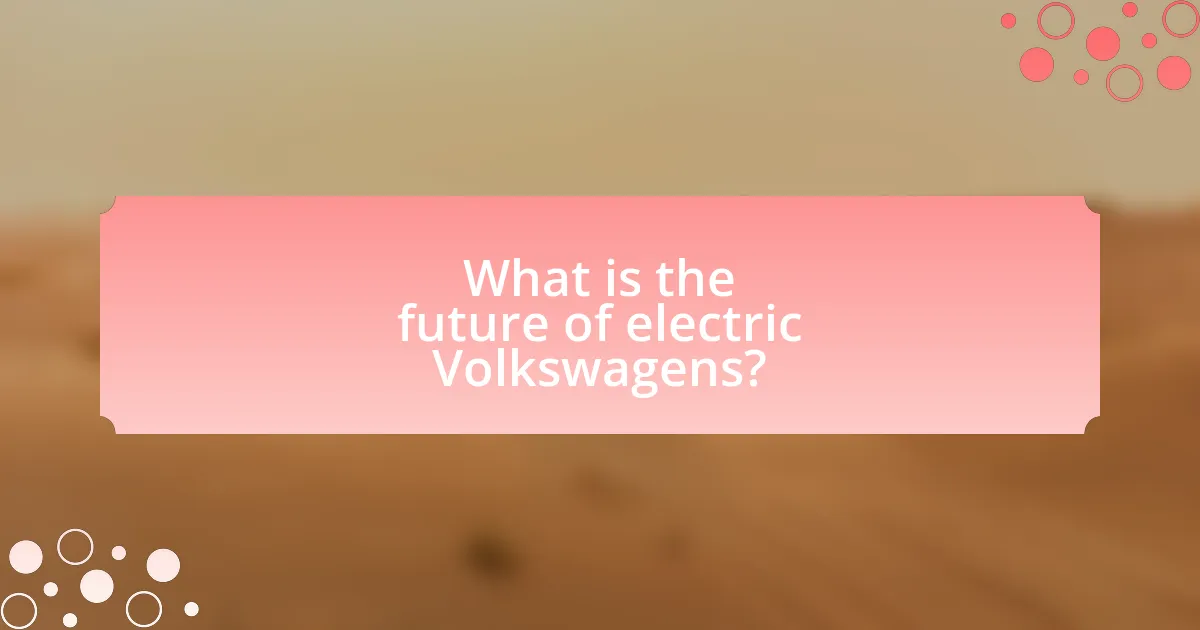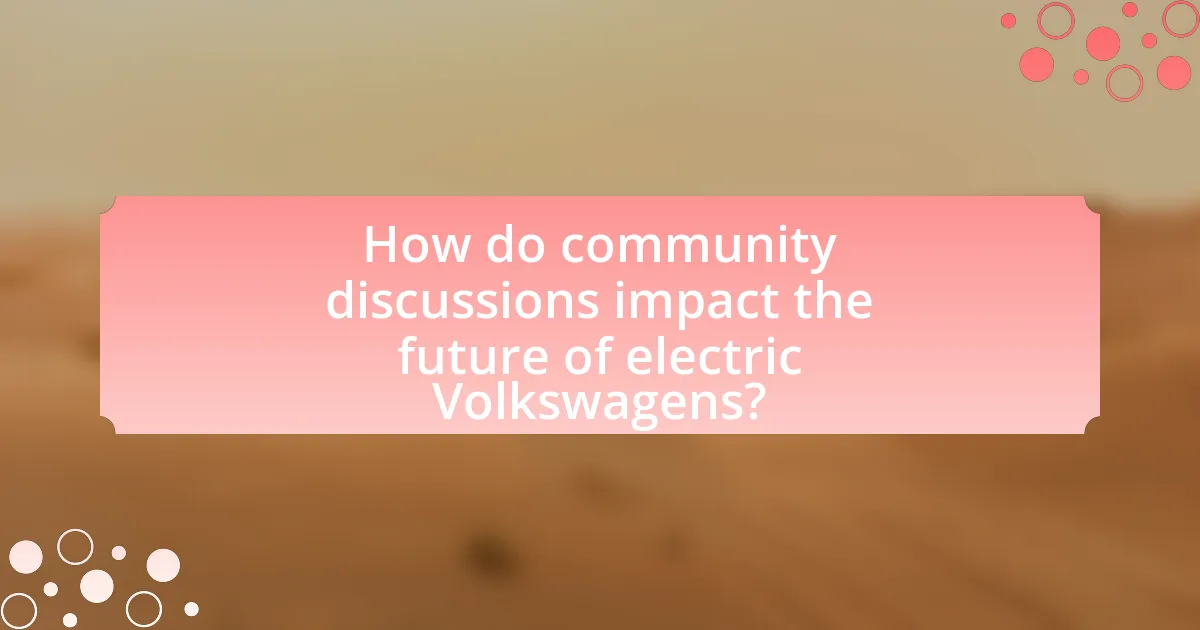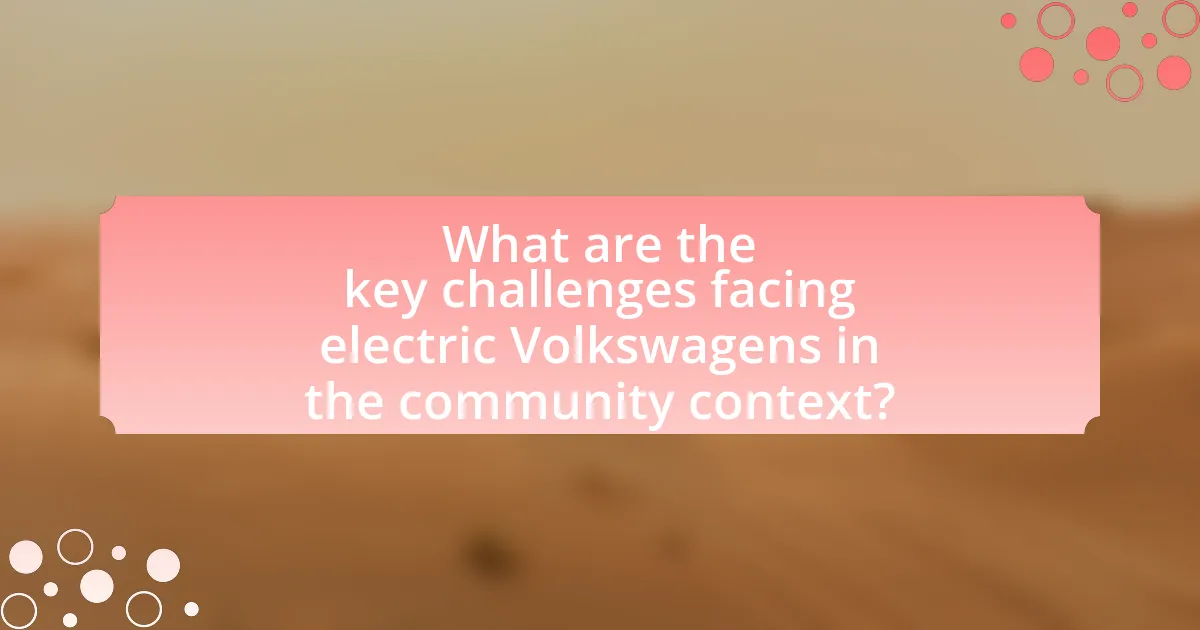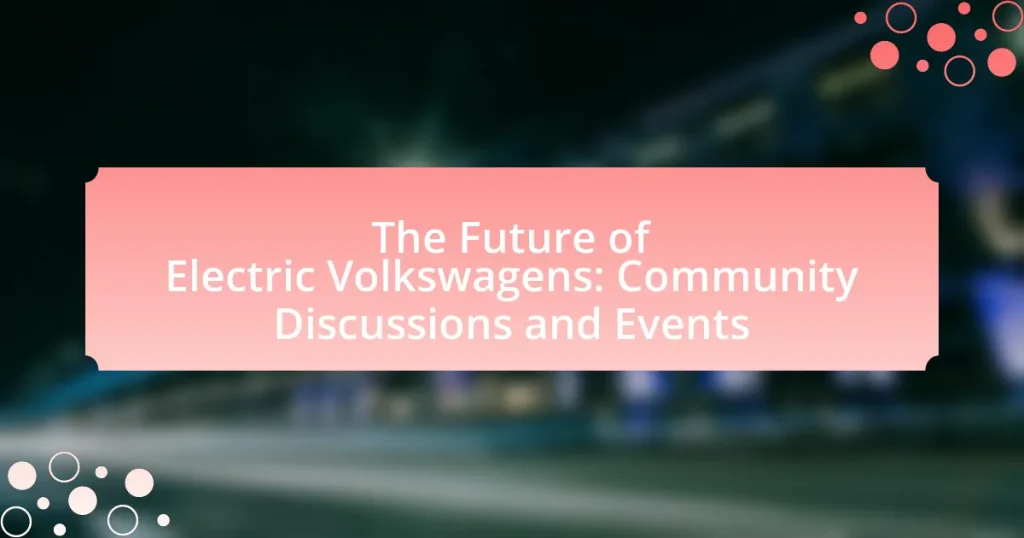The article focuses on the future of electric Volkswagens, highlighting the company’s commitment to expanding its electric vehicle lineup and achieving sustainability goals. Volkswagen plans to launch multiple electric models by 2025, invest over €30 billion in electric mobility, and produce 1.5 million electric vehicles annually. Key topics include the evolution of electric Volkswagens in the automotive market, technological advancements influencing their models, the impact of consumer preferences, and the importance of community engagement in shaping electric vehicle policies and designs. Additionally, the article discusses challenges such as charging infrastructure and environmental concerns, while emphasizing the role of community discussions and events in promoting electric vehicle adoption.

What is the future of electric Volkswagens?
The future of electric Volkswagens is focused on expanding their electric vehicle lineup and achieving significant sustainability goals. Volkswagen aims to launch numerous electric models by 2025, including the ID.4 and ID. Buzz, as part of their strategy to become a leader in the electric vehicle market. The company has committed to investing over €30 billion in electric mobility and plans to produce 1.5 million electric vehicles annually by 2025. This commitment is supported by their goal to reduce carbon emissions across their production processes and supply chains, aligning with global trends towards sustainability and environmental responsibility.
How are electric Volkswagens evolving in the automotive market?
Electric Volkswagens are evolving in the automotive market by expanding their electric vehicle (EV) lineup and enhancing technology integration. The introduction of models like the ID.4 and ID. Buzz showcases Volkswagen’s commitment to electrification, aiming for 70% of its European sales to be electric by 2030. Additionally, Volkswagen is investing heavily in battery technology and charging infrastructure, with plans to establish a robust network of fast chargers across Europe and North America. This strategic shift is supported by the company’s goal to become carbon neutral by 2050, aligning with global sustainability trends and consumer demand for eco-friendly vehicles.
What technological advancements are influencing electric Volkswagen models?
Technological advancements influencing electric Volkswagen models include the development of the MEB platform, enhanced battery technology, and advanced driver-assistance systems. The MEB platform, specifically designed for electric vehicles, allows for greater efficiency and flexibility in design, enabling Volkswagen to produce a range of electric models with optimized space and performance. Enhanced battery technology, such as solid-state batteries, promises increased energy density and faster charging times, which are critical for improving the overall driving experience. Additionally, advanced driver-assistance systems, including autonomous driving features and connectivity solutions, are being integrated to enhance safety and user experience, reflecting Volkswagen’s commitment to innovation in the electric vehicle market.
How do consumer preferences shape the future of electric Volkswagens?
Consumer preferences significantly shape the future of electric Volkswagens by driving the demand for sustainable and innovative vehicle features. As consumers increasingly prioritize environmental sustainability, Volkswagen has responded by enhancing its electric vehicle lineup, such as the ID. series, which emphasizes zero emissions and energy efficiency. Market research indicates that 54% of consumers are willing to pay more for electric vehicles that align with their eco-friendly values, compelling Volkswagen to invest in advanced battery technology and charging infrastructure. This alignment with consumer expectations not only influences product development but also informs marketing strategies, ensuring that Volkswagen remains competitive in the evolving automotive landscape.
Why is community engagement important for electric Volkswagens?
Community engagement is important for electric Volkswagens because it fosters brand loyalty and enhances customer feedback. Engaging with local communities allows Volkswagen to understand consumer needs and preferences, which can lead to improved product offerings and services. For instance, community events can provide insights into how electric vehicles are perceived, helping the company to address concerns and adapt its marketing strategies effectively. Additionally, studies show that companies with strong community ties often experience increased sales and customer satisfaction, reinforcing the value of community engagement in building a positive brand image for electric Volkswagens.
What role do community discussions play in shaping electric vehicle policies?
Community discussions play a crucial role in shaping electric vehicle policies by facilitating dialogue between stakeholders, including consumers, manufacturers, and policymakers. These discussions provide a platform for sharing concerns, preferences, and suggestions regarding electric vehicle adoption and infrastructure development. For instance, community forums often highlight local needs, such as charging station placement, which can influence policy decisions at municipal and state levels. Research indicates that public engagement in policy-making leads to more effective and accepted policies, as seen in various regions where community input has directly impacted electric vehicle incentives and regulations.
How can community feedback influence Volkswagen’s electric vehicle designs?
Community feedback can significantly influence Volkswagen’s electric vehicle designs by providing insights into consumer preferences and expectations. This feedback allows Volkswagen to identify desired features, design elements, and performance metrics that resonate with potential buyers. For instance, surveys and focus groups conducted by Volkswagen have revealed that customers prioritize range, charging speed, and sustainability in electric vehicles. By integrating this feedback into their design process, Volkswagen can enhance customer satisfaction and market competitiveness, ultimately leading to more successful electric vehicle models.
What events are being organized around electric Volkswagens?
Various events are being organized around electric Volkswagens, including community meetups, electric vehicle expos, and test drive events. These gatherings aim to promote awareness and education about electric mobility, showcasing Volkswagen’s electric models like the ID.4 and ID. Buzz. For instance, Volkswagen has hosted events such as the “Volkswagen ID. Experience” tour, which allows potential customers to test drive electric vehicles and learn about their features. Additionally, local car clubs and environmental organizations frequently organize discussions and workshops focused on the benefits of electric vehicles, further engaging the community in the transition to sustainable transportation.
What types of events are most popular among electric Volkswagen enthusiasts?
Electric Volkswagen enthusiasts most commonly participate in events such as electric vehicle (EV) expos, meetups, and car shows specifically focused on electric models. These events provide platforms for enthusiasts to showcase their vehicles, share experiences, and discuss advancements in electric vehicle technology. For instance, events like the Electric Vehicle Symposium and local VW meetups often feature discussions on the latest electric Volkswagen models, charging infrastructure, and sustainability practices, attracting a dedicated audience of electric vehicle fans.
How do these events foster community among electric vehicle users?
Events foster community among electric vehicle users by providing a platform for networking, sharing experiences, and exchanging knowledge. These gatherings encourage collaboration and support among users, enhancing their sense of belonging. For instance, events often feature workshops, panel discussions, and social activities that facilitate interaction, allowing participants to discuss topics such as charging infrastructure, maintenance tips, and sustainability practices. Research indicates that community engagement in such events leads to increased user satisfaction and loyalty, as participants feel more connected to a shared mission of promoting electric mobility.

How do community discussions impact the future of electric Volkswagens?
Community discussions significantly influence the future of electric Volkswagens by shaping consumer perceptions and preferences. These discussions provide a platform for potential buyers to share experiences, concerns, and expectations regarding electric vehicles, which can directly inform Volkswagen’s product development and marketing strategies. For instance, feedback from community forums has led to enhancements in battery technology and charging infrastructure, as seen in the development of the ID.4 model, which was influenced by user input on range and usability. Additionally, community engagement fosters brand loyalty and trust, as consumers feel their voices are heard, ultimately driving sales and adoption rates of electric Volkswagens.
What platforms are available for community discussions on electric Volkswagens?
Platforms available for community discussions on electric Volkswagens include dedicated forums, social media groups, and online communities. Notable examples are the Volkswagen ID. Forum, Facebook groups like “Volkswagen ID. Owners,” and Reddit communities such as r/VWID4. These platforms facilitate interaction among enthusiasts, sharing experiences, and discussing topics related to electric Volkswagens.
How do social media channels facilitate conversations about electric Volkswagens?
Social media channels facilitate conversations about electric Volkswagens by providing platforms for users to share experiences, insights, and opinions. These channels, such as Facebook, Twitter, and Instagram, enable real-time discussions, allowing enthusiasts and potential buyers to engage with each other and with the brand directly. For instance, Volkswagen’s official social media accounts often post updates, promotions, and user-generated content, which encourages interaction and feedback from the community. Additionally, hashtags related to electric Volkswagens help aggregate conversations, making it easier for users to find and participate in discussions. This dynamic interaction fosters a sense of community and keeps the conversation about electric Volkswagens active and relevant.
What online forums are dedicated to electric Volkswagen discussions?
Online forums dedicated to electric Volkswagen discussions include VWVortex, ID.4 Owners Club, and the Electric Vehicle Forum. VWVortex features a section specifically for electric vehicles, allowing users to share experiences and advice. The ID.4 Owners Club focuses on discussions related to the ID.4 model, providing a platform for owners to connect. The Electric Vehicle Forum encompasses a broader range of electric vehicle topics, including dedicated threads for electric Volkswagens, facilitating community engagement and information exchange.
How can community discussions lead to innovation in electric Volkswagens?
Community discussions can lead to innovation in electric Volkswagens by facilitating the exchange of ideas, feedback, and collaborative problem-solving among users and stakeholders. These discussions often highlight user needs and preferences, which can inform design improvements and feature enhancements. For instance, forums and social media platforms allow electric vehicle owners to share their experiences and suggest modifications, leading to practical innovations such as improved battery technology or enhanced software features. Research indicates that companies that engage with their communities can achieve a 20% increase in customer satisfaction and loyalty, which directly correlates with increased innovation and market competitiveness.
What examples exist of community-driven innovations in electric vehicles?
Community-driven innovations in electric vehicles include initiatives like the DIY electric vehicle conversion projects, where enthusiasts modify traditional vehicles into electric ones, exemplified by the Electric Vehicle Association’s workshops. Additionally, platforms like Local Motors have engaged communities in co-creating electric vehicle designs, leading to the development of the Olli, an autonomous shuttle. These examples demonstrate how grassroots efforts can significantly contribute to advancements in electric vehicle technology and design.
How does collaboration between users and manufacturers enhance product development?
Collaboration between users and manufacturers enhances product development by integrating user feedback directly into the design and functionality of products. This partnership allows manufacturers to identify user needs and preferences, leading to more relevant and innovative solutions. For instance, in the automotive industry, companies like Volkswagen have utilized community discussions to gather insights on electric vehicle features, resulting in improved user satisfaction and market alignment. Research indicates that products developed with user input have a higher success rate, as they are tailored to meet actual consumer demands, thereby reducing the risk of market failure.

What are the key challenges facing electric Volkswagens in the community context?
The key challenges facing electric Volkswagens in the community context include limited charging infrastructure, high initial costs, and community acceptance. Limited charging infrastructure restricts the convenience of owning an electric vehicle, as many areas lack sufficient charging stations, making it difficult for users to recharge their vehicles. High initial costs deter potential buyers, as electric Volkswagens often have a higher purchase price compared to traditional vehicles, despite lower long-term operating costs. Community acceptance is also a challenge, as some individuals may have concerns about the reliability and performance of electric vehicles, which can hinder widespread adoption. These challenges collectively impact the integration of electric Volkswagens into communities, affecting their overall market penetration and user experience.
What concerns do community members have regarding electric Volkswagens?
Community members express concerns about the reliability and charging infrastructure of electric Volkswagens. Many individuals worry that the current charging network may not be sufficient to support widespread adoption, particularly in rural areas where access to charging stations is limited. Additionally, there are apprehensions regarding battery longevity and performance, with some community members questioning whether electric Volkswagens can maintain efficiency over time compared to traditional vehicles. These concerns are often supported by reports indicating that inadequate charging infrastructure can hinder the transition to electric vehicles, as highlighted in studies by the International Council on Clean Transportation.
How do issues of charging infrastructure affect electric Volkswagen adoption?
Issues of charging infrastructure significantly hinder electric Volkswagen adoption by creating barriers to convenient and accessible charging options for potential users. A lack of sufficient charging stations leads to range anxiety among consumers, who may fear running out of battery power without nearby charging facilities. According to a 2021 study by the International Council on Clean Transportation, inadequate charging infrastructure is one of the top reasons consumers hesitate to purchase electric vehicles, including models from Volkswagen. Furthermore, the uneven distribution of charging stations, particularly in rural areas, exacerbates this issue, limiting the practicality of owning an electric Volkswagen for many potential buyers.
What are the environmental concerns associated with electric vehicle production?
Electric vehicle production raises several environmental concerns, primarily related to battery manufacturing, resource extraction, and energy consumption. The production of lithium-ion batteries, essential for electric vehicles, involves mining for lithium, cobalt, and nickel, which can lead to habitat destruction, water pollution, and significant carbon emissions. For instance, lithium extraction in South America has been linked to water depletion in local communities. Additionally, the energy-intensive processes required for battery production contribute to greenhouse gas emissions, with estimates suggesting that battery manufacturing can account for up to 30% of an electric vehicle’s total lifecycle emissions. Furthermore, the disposal and recycling of batteries pose challenges, as improper handling can lead to toxic waste and environmental contamination.
How can communities address these challenges effectively?
Communities can address the challenges of transitioning to electric Volkswagens effectively by fostering collaboration among local stakeholders, including government, businesses, and residents. This collaboration can lead to the development of infrastructure, such as charging stations, which is essential for supporting electric vehicle adoption. For instance, cities that have implemented comprehensive electric vehicle strategies, like San Francisco, have seen a significant increase in electric vehicle usage due to accessible charging options and community engagement initiatives. Additionally, organizing educational events and workshops can raise awareness about the benefits of electric vehicles, helping to dispel myths and encourage more residents to consider electric Volkswagens as a viable option.
What initiatives can be taken to improve charging accessibility for electric Volkswagens?
To improve charging accessibility for electric Volkswagens, initiatives should include expanding the network of charging stations, particularly in urban and rural areas. Increasing the number of fast-charging stations along highways and in public spaces can significantly enhance convenience for electric vehicle owners. According to the International Energy Agency, the global number of public charging points increased to over 1.3 million in 2020, indicating a growing infrastructure that can be leveraged for Volkswagen’s electric models. Collaborating with local governments and private companies to install charging stations in high-traffic areas can further facilitate access. Additionally, implementing incentives for businesses to provide charging facilities can encourage more locations to offer this service, thereby improving overall accessibility for electric Volkswagen users.
How can community advocacy influence policy changes for electric vehicles?
Community advocacy can significantly influence policy changes for electric vehicles by mobilizing public support and raising awareness about the benefits of electric mobility. Advocacy groups often engage in campaigns that highlight environmental concerns, economic advantages, and public health benefits associated with electric vehicles, which can sway policymakers to prioritize supportive legislation. For instance, studies have shown that regions with active advocacy efforts, such as California, have implemented more robust incentives for electric vehicle adoption, including rebates and charging infrastructure investments, leading to a substantial increase in electric vehicle registrations.
What are some best practices for engaging in community discussions about electric Volkswagens?
To effectively engage in community discussions about electric Volkswagens, participants should prioritize respectful communication and active listening. Respectful communication fosters a positive environment, encouraging diverse opinions and constructive feedback. Active listening ensures that all voices are heard, which is crucial for understanding different perspectives on electric vehicle technology and its implications.
Additionally, sharing factual information about electric Volkswagens, such as their environmental benefits and technological advancements, can enhance the quality of discussions. For instance, studies indicate that electric vehicles can reduce greenhouse gas emissions significantly compared to traditional combustion engines. Engaging with credible sources, such as Volkswagen’s official reports or industry research, can provide valuable insights and support informed conversations.
Finally, utilizing social media platforms and local community events can facilitate broader participation and engagement, allowing for a more comprehensive dialogue about the future of electric Volkswagens.


